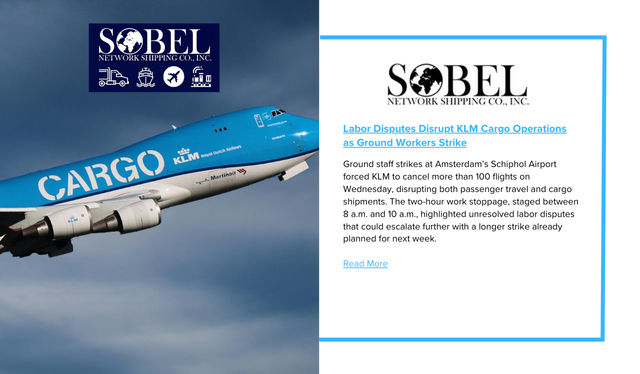Ground staff strikes at Amsterdam’s Schiphol Airport forced KLM to cancel more than 100 flights on Wednesday, disrupting both passenger travel and cargo shipments. The two-hour work stoppage, staged between 8 a.m. and 10 a.m., highlighted unresolved labor disputes that could escalate further with a longer strike already planned for next week.
The airline confirmed that two unions representing ground workers rejected negotiations over a new collective labor agreement and instead opted for strike action. Although KLM recently reached agreements with three other unions covering ground staff, the refusal by the remaining groups underscores ongoing divisions within the workforce.
Impact on Cargo Operations
KLM’s cargo division, which plays a crucial role in Europe–Asia trade lanes and trans-Atlantic logistics, was particularly affected. The carrier pre-emptively suspended free sales on the cancelled flights and began rerouting shipments already in its system to alternative aircraft and connections. Still, cargo operators and shippers face delays as rescheduling creates bottlenecks across the network.
The strike comes at a sensitive time for the airfreight market, which is still managing capacity shifts linked to tariff-driven trade disruptions and geopolitical rerouting. Any interruption in schedules at a hub as critical as Schiphol has ripple effects across multiple global supply chains, including pharmaceuticals, perishables, and high-value industrial goods.
Labor Dispute Context
Union representatives have voiced concerns about workload, staffing levels, and compensation, pointing to inflationary pressures and increased cargo demand since the pandemic. While KLM has signed agreements with other unions, the breakdown with these two groups leaves a gap in the airline’s effort to stabilize labor relations.
Industry observers note that the walkout is part of a broader trend in European aviation, where labor costs and worker expectations are increasingly colliding with airlines’ efforts to maintain competitiveness in a volatile market. Rising operating costs, coupled with tariff-related uncertainties in global trade, are creating added strain for airlines trying to manage tight margins.
Next Steps
The unions behind Wednesday’s action have already scheduled a second strike for next Wednesday, lasting four hours. If carried out, the longer disruption could cause an even greater wave of cancellations, affecting both passenger and freight capacity at one of Europe’s busiest hubs.
For shippers, the strikes add another layer of unpredictability to an already turbulent logistics environment. With many carriers already redirecting capacity to higher-yield routes and alternative hubs, the prolonged labor dispute may push freight forwarders and exporters to seek backup options outside of Schiphol.
KLM, meanwhile, continues to stress its commitment to dialogue, but the immediate challenge will be keeping operations stable in the face of mounting labor action. The dispute highlights the fragility of supply chains dependent on major European gateways and the broader need for labor stability to sustain international trade flows.


